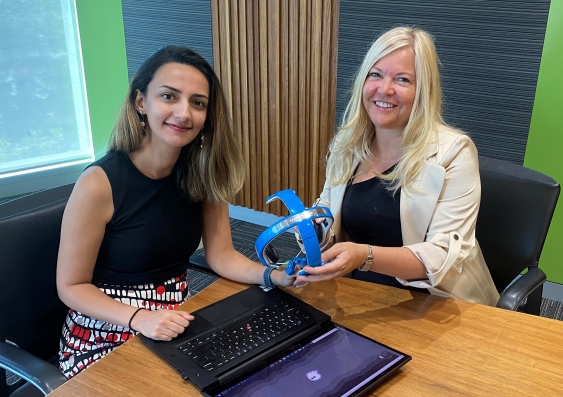UNSW researchers receive more than $17m in NHMRC funding
Teaching people to gain control over their brain to relieve chronic pain and improving food and water security are two of the innovative UNSW Sydney projects to receive Ideas Grants.
Teaching people to gain control over their brain to relieve chronic pain and improving food and water security are two of the innovative UNSW Sydney projects to receive Ideas Grants.

UNSW researchers have secured more than $17 million for 21 projects in the latest round of National Health and Medical Research Council (NHMRC) Ideas Grants.
The funding, which commences in 2021 and runs over several years, will help drive solutions to some of Australia’s pressing but preventable health challenges.
UNSW Associate Professor Sylvia Gustin from UNSW Science and NeuRA was awarded $1.56 million for a project to develop and test a brain-computer interface, called ‘NeuroGame’, to treat chronic pain. NeuroGame will teach people to gain control over their brain rhythms via neurofeedback in a way that ameliorates their pain. This project is expected to provide a foundation for future chronic pain research and management that has tangible implications for individuals living with chronic pain. A/Prof. Gustin’s project is a collaboration between scientists from NeuRA, University of Technology Sydney, University of Sydney, University of Washington, University of South Australia and Charles Sturt University.
Dr Renjing Liu from the Victor Chang Cardiac Research Institute and UNSW Medicine received $1.28 million for fundamental research into understanding the molecular mechanisms leading to vascular calcification. The overall objective of the project is to identify new therapies to treat this disease. Vascular calcification, or the deposition of bone-like material in the blood vessels, is a leading contributor to cardiovascular disease morbidity and mortality. Dr Liu’s project is a collaboration between scientists from the Victor Chang Cardiac Research Institute, the Centenary Institute, the University of Sydney and clinicians from the Baird Institute and Royal Prince Alfred Hospital.
Professor Jacqui Webster from The George Institute for Global Health and UNSW Medicine received $1.16 million for a project to co-design solutions for food and water insecurity for Aboriginal and Torres Strait Islander communities in Australia, including the high sodium levels in the bore water in Walgett, New South Wales. The project will use community-led processes that take account of Indigenous rights and knowledge to implement and evaluate sustainable community solutions.
UNSW Pro Vice-Chancellor Research Professor Ana Deletic said this new funding will enable UNSW researchers to undertake important research that could improve the lives of people in Australia and around the world.
“I’m proud of the UNSW researchers who were successful in this round of funding. Their projects will enable us to continue to strengthen our biomedical and clinical research, and tackle some of the major health problems facing society,” Prof. Deletic said.
The other UNSW recipients are:
Dr Mate Biro, from UNSW Medicine, received $923,000, to investigate ways of increasing T cell infiltration of solid tumours.
Associate Professor Julie Brown, from The George Institute for Global Health and UNSW Medicine, received $691,000 to develop a cost-effective way to educate people on the correct use of child car restraints.
Dr Thomas Cox, from the Garvan Institute of Medical Research, received $702,000 to investigate the collagen-rich matrix as a driver of breast cancer progression and resistance to therapy.
Professor Richard Harvey, from the Victor Chang Cardiac Research Institute and UNSW Medicine, received $1.19 million to research an approach to understanding fibroblast agency in models of heart disease.
Professor Herbert Herzog, from the Garvan Institute of Medical Research and UNSW Medicine, received $923,000 for a project to investigate feeding behaviour and obesity.
Associate Professor Cecile King, from the Garvan Institute of Medical Research and UNSW Medicine, received $934,000 to investigate the role of natural antisense transcripts in immune regulation.
Dr Vincent Laurent, from UNSW Science, received $400,000 to examine the metabolic and cognitive deficits caused by insulin resistance.
Dr Nicola Lee, from the Garvan Institute of Medical Research and UNSW Medicine, received $684,000 to research central leptin control of energy partitioning.
Scientia Professor Nigel Lovell, from UNSW Engineering, received $731,000 for a project to re-engineer electrophysiological measurements and brain-machine interfaces.
Associate Professor David Muller, from UNSW Medicine, received $593,000 for a project to improve cardiac valve implant outcomes with advanced computer simulation.
Associate Professor Marina Pajic, from the Garvan Institute of Medical Research and UNSW Medicine, received $855,000 to identify the cause and finding a therapy for oral squamous cell carcinoma.
Dr Simone Pettigrew, from The George Institute for Global Health and UNSW Medicine, received $738,000 for a project that will review health considerations due to the emergence of autonomous vehicles.
Dr Tri Phan, from the Garvan Institute of Medical Research and UNSW Medicine, received $721,000 to investigate how defective cell clearance leads to the activation of self-reactive B cells.
Associate Professor Phoebe Phillips, from UNSW Medicine, received $738,000 to develop novel therapies to target pancreatic and lung cancer cells.
Dr Andrea Schaffer, from UNSW Medicine, received $480,000 to investigate the relationship between multiple chronic conditions, medicine use and cardiovascular health.
Professor Kerry-Anne Rye, from UNSW Medicine, received $1.09 million for a project to generate beta cells in type 1 diabetes with novel mimetic peptides.
Professor Thomas Whitford, from UNSW Science, received $563,000 to establish the neural basis of hallucinations in schizophrenia.
Dr Adrienne Withall, from UNSW Medicine, received $884,000 to develop an audio app to check the cognition and age-related health in older prisoners.